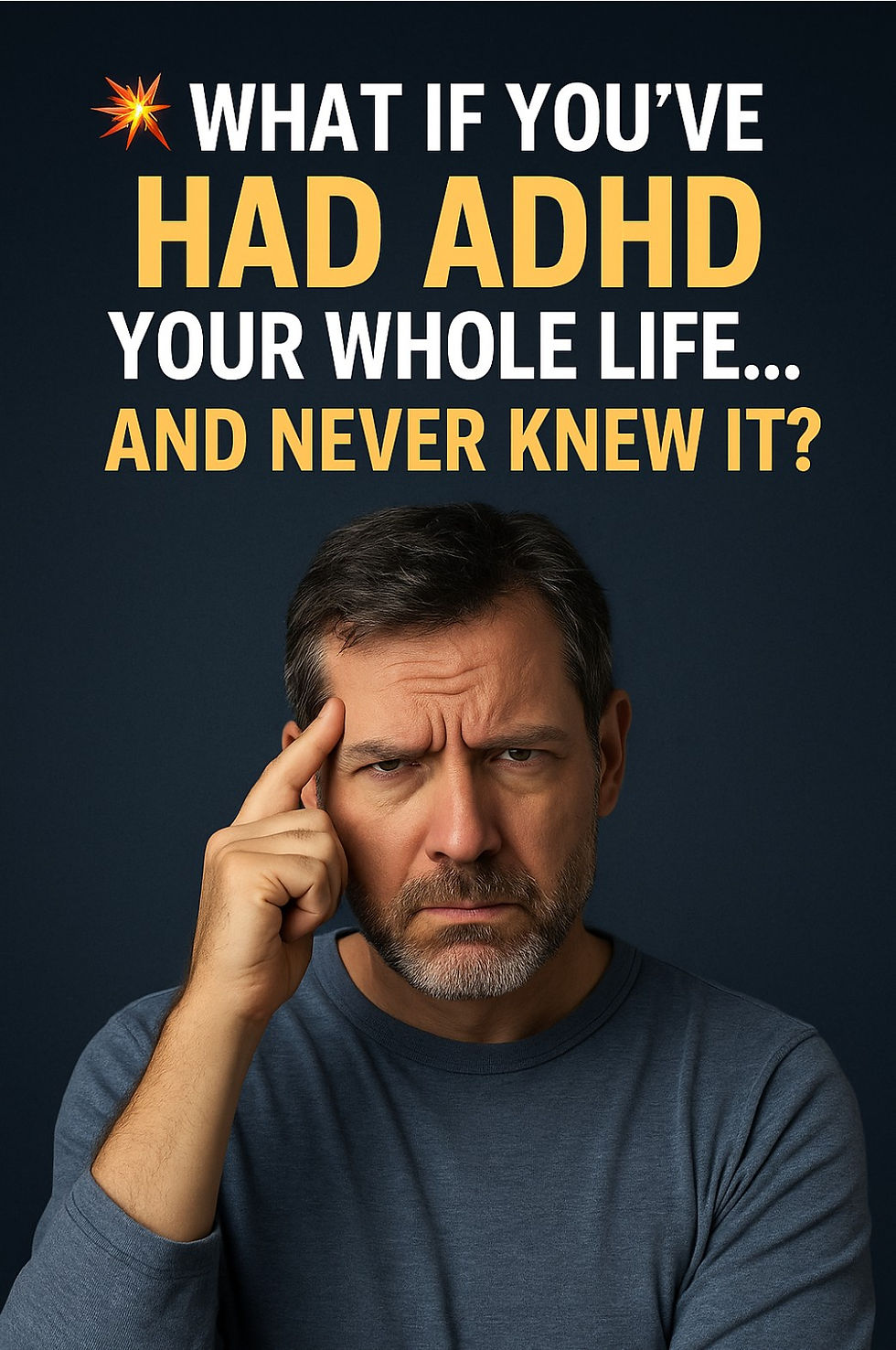Adult ADHD - Are You Sure You Don’t Have It?
- Jun 26, 2025
- 4 min read

Have you ever asked yourself:
"Why do I keep forgetting things?"
"Why can’t I stay focused?"
"Why does my mind never stop racing?"
You may have blamed stress, age, or burnout. But what if the truth is something else entirely — something that has been hiding in plain sight?
What if you’ve been living with undiagnosed ADHD all this time?
ADHD Isn’t Just for Kids
We’ve been conditioned to think of ADHD as something that only affects hyperactive schoolchildren. But for millions of adults — even into their 60s and 70s — ADHD is a silent disruptor of everyday life. And the worst part? They don’t even know it.
Here’s the shocking truth: ADHD doesn’t go away with age — it just hides better.
Everyday Signs You May Be Living With ADHD (Without Knowing It)
Do any of these sound like you?
You constantly misplace your phone, wallet, or keys.
You start 5 things and finish none.
You struggle to focus on conversations — even with people you love.
You procrastinate, then panic.
You feel easily overwhelmed by small tasks.
You often interrupt others, even when you don’t mean to.
You forget appointments, birthdays, or to reply to important messages.
Your brain feels like it’s running 50 tabs at once — all the time.
You feel guilty for not "getting your life together," no matter how hard you try.
You might have spent years thinking you're lazy, disorganized, or emotionally sensitive. But what if it’s not a personality flaw? What if it’s ADHD?
Untreated ADHD Can Lock You Out of the Life You Deserve
Living with untreated ADHD as an adult can feel like always running late to your own life.
It can…
🧠 Sabotage your career: Missed deadlines, constant distractions, poor follow-through
❤️ Hurt your relationships: Not listening, forgetting things, or being emotionally reactive
🏠 Drain your home life: A house in chaos, projects half-done, constant mental clutter
😔 Steal your joy: Feeling guilty, anxious, or like you’re "not enough"
The worst part? Many adults blame themselves — instead of realizing their brain just works differently.
ADHD in Adults — The Hidden Epidemic

ADHD is far more common in adults than most people realize — and tragically, many remain undiagnosed their entire lives.
According to the American Psychiatric Association:
Over 4.4% of U.S. adults have ADHD — that’s more than 11 million people.
But fewer than 20% of them ever receive a formal diagnosis.
ADHD in adults often presents differently than in children — with less hyperactivity, and more internal chaos, distraction, forgetfulness, and emotional reactivity.
In one large European study, 60% of adults diagnosed with ADHD reported serious life impairment related to work, relationships, or emotional health.
What does that mean? It means millions of people — maybe even you — could be struggling in silence, simply because no one ever suggested that ADHD might be the missing piece of the puzzle.
Who Suffers More from ADHD in Adulthood - Men or Women?

While ADHD is more commonly diagnosed in boys during childhood, adult ADHD tells a more complicated story.
In childhood, boys are diagnosed 2–3 times more often than girls — largely because boys tend to display external symptoms like hyperactivity and impulsivity.
Girls, on the other hand, often show internal symptoms — such as daydreaming, disorganization, anxiety, or emotional sensitivity — which are easier to overlook or mislabel.
As these children grow into adults, the gender gap narrows — and many women are finally diagnosed in their 30s, 40s, or even later.
But here’s the twist:
While more adult men are officially diagnosed,
Adult women may suffer more silently, often misdiagnosed with anxiety or depression, or dismissed as simply “overwhelmed.”
This leads many women to carry guilt, burnout, and low self-esteem for years — without ever realizing that ADHD could be the root cause.
👉 If you're a woman who’s constantly juggling, forgetting, or feeling emotionally drained, this might explain a lot.
Natural Ingredients, Backed by Science
You don’t need to rely on harsh medications or feel like you’re broken.
That’s why ADH-Done was created, a natural supplement designed to support focus, memory, mood, and clarity — for both adults and children with ADHD tendencies.
Here’s how the ingredients in ADH-Done support brain health and focus:
Saffron
Multiple clinical studies have shown that saffron extract can help improve attention, reduce hyperactivity, and stabilize mood — especially in people with ADHD.
A 2019 study published in Psychiatry and Clinical Neurosciences found that saffron was as effective as Ritalin in managing ADHD symptoms in children — with fewer side effects.
Vitamin B6 (Pyridoxine)
B6 is critical for producing neurotransmitters like dopamine and serotonin — which regulate focus, attention, and mood stability.
American Ginseng
A well-known adaptogen, it helps improve cognitive performance, energy, and clarity, especially during stress or mental fatigue.
Vitamin B3 (Niacin)
Supports healthy circulation and neurotransmitter production. Deficiencies are linked to poor concentration, irritability, and low motivation.
L-Glutamine
An amino acid that helps reduce mental fog, improve clarity, and support gut-brain communication.
Imagine Life with ADHD Done Right:
✅ You finish what you start
✅ You feel calm instead of constantly scattered
✅ You listen more, forget less
✅ You feel focused at work — and present at home
✅ You feel like yourself — finally
Still Wondering If It’s You?
If this post hit a nerve — if you’re nodding along — then maybe it’s time to stop blaming yourself, and start supporting your brain.
Try ADH-Done today, and start feeling the difference — naturally.
Bonus: It’s also great for kids
The ingredients in ADH-Done are gentle, safe, and effective for children as well — making it a go-to natural support for families living with attention challenges.
Take Back Control of Your Mind — Naturally
Millions of adults live with ADHD symptoms without knowing why life feels so overwhelming. If you're ready to find calm, clarity, and focus again — ADH-Done can help.




Comments